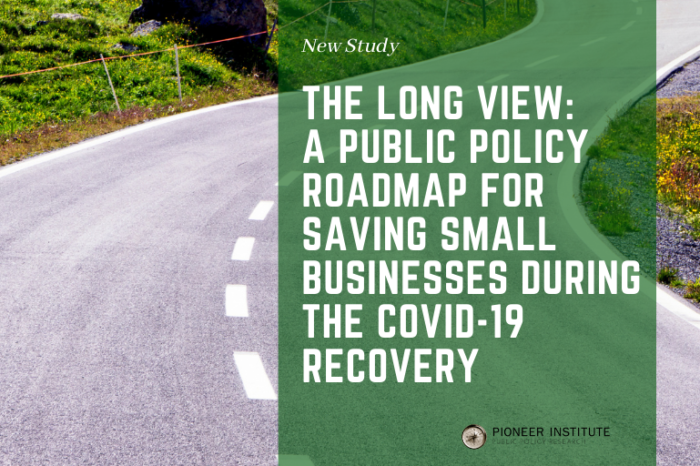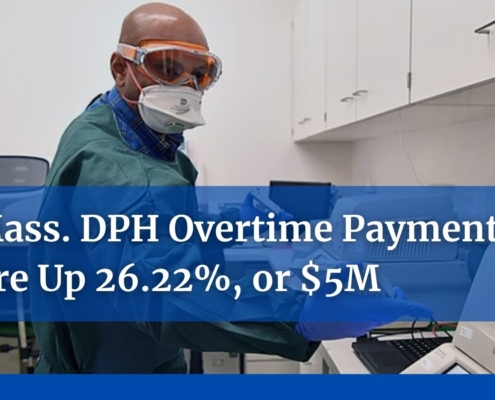Study: Economic Recovery from COVID Will Require Short-Term Relief, Long-Term Reforms
Pioneer Institute calls for combination of rent relief, tax credits and deductions, regulatory reform, infrastructure investment and fiscal resilience measures
BOSTON — As the initial economic recovery from the COVID-19 pandemic has slowed, a new study from Pioneer Institute finds that governments must continue to provide short-term relief to stabilize small businesses as they simultaneously consider longer-term reforms to hasten and bolster recovery – all while facing a need to shore up public sector revenues.
“This study focuses on what the state can do to ensure that our hardest-hit industries can survive and avoid massive unemployment,” said Pioneer Executive Director Jim Stergios. “These are real lives — 800,000 of them employed in the restaurant, retail, and travel and leisure industries alone – and thousands more who put their livelihoods at risk creating these jobs.”
Rent Relief, Tax Credits/Deductions, Regulatory Reform, and Infrastructure Investment
Rent Relief
Aid for regularly scheduled rent payments improves cash flow and allows small businesses to rehire employees, but relief should also extend to commercial landlords who need to recoup their costs.
“A combination of rent relief, tax credits and deductions, regulatory reform and infrastructure investment, together with fiscal resilience measures are among the actions needed if we are to emerge successfully from the current economic crisis,” said Greg Sullivan, who co-authored “The Long View: A Public Policy Roadmap for Saving Small Businesses During the COVID-19 Recovery Period,” with Andrew Mikula and Rebekah Paxton.
One potential guide is the loss-sharing model used in Canada’s Emergency Commercial Rent Assistance program. There, loans to commercial landlords covered half the rent owed by small businesses in April-June of this year. The loans were eligible for forgiveness if the landlords enacted agreements with small businesses that included a 75 percent rent reduction and a non-eviction clause. The tenant would then pay 25 percent of the normal rent. Canadian provinces and territories were responsible for a quarter of the government’s costs.
Here, the authors recommend a graduated system of rent relief loans based on the size of the tenants.
Tax Credits/Deductions
The authors recommend expanded tax credits for consumer spending in particularly hard-hit areas, such as brick-and-mortar retail and independent restaurants. They also urge that credits be made available to small businesses for the purchase of pandemic safety equipment such as barriers, cleaning materials and PPE for employees. Two bills to create the credits have been proposed in Congress.
Congress should also extend a measure slated to expire in 2023 that provides immediate 100 percent tax deductions for small business capital expenditures until at least 2026.
Regulatory Reform and Infrastructure Investment
State and local governments should replace burdensome occupational licensing regulations for service occupations with inspection regimes. Currently, too much occupational licensing is designed to benefit the politically connected by preventing competitors from entering the market, not to protect public safety.
Governments should also loosen land use restrictions to allow more office-like home businesses and permit minimally disruptive retail such as barber shops in detached garages, backyard sheds or even basements.
The authors call for national investment to extend the availability of broadband, particularly to rural areas. This would improve business competitiveness and help connect disadvantaged individuals with rural work and educational opportunities.
Fiscal Resilience
The study also explores ways in which the state can steward the stabilization, or “rainy day,” fund during this health, economic and fiscal crisis.
Massachusetts should raise the limit on how much money can be annually transferred into its rainy-day fund and consider adding new revenue streams that flow directly to the fund. The Commonwealth currently has $3.5 billion in its stabilization account, while the budget deficit for the coming year is estimated to be $6 billion.
The authors also call for more flexibility when it comes to how rainy-day fund money can be used during times of hardship.
“Every additional dollar added to the stabilization fund during prosperous times is another dollar that can be used to stimulate the economy and prevent families from falling into poverty during times of crisis,” said Pioneer’s Research Assistant Andrew Mikula.
About the Authors
Andrew Mikula is a Research Assistant. Mr. Mikula was previously a Lovett & Ruth Peters Economic Opportunity Fellow at Pioneer Institute and studied economics at Bates College.
Rebekah Paxton is a Research Analyst at Pioneer Institute. She first joined Pioneer in 2017 as a Roger Perry intern, writing about various transparency issues within the Commonwealth, including fiscal policy and higher education. Since then, she has worked on various research projects under PioneerPublic and PioneerOpportunity, in areas of state finance, public policy, and labor relations. She recently earned an M.A. in Political Science and a B.A. in Political Science and Economics, from Boston University, where she graduated summa cum laude.
Gregory Sullivan is Pioneer’s Research Director. Prior to joining Pioneer, Sullivan served two five-year terms as Inspector General of the Commonwealth of Massachusetts and was a 17-year member of the Massachusetts House of Representatives. Greg is a Certified Fraud Investigator, and holds degrees from Harvard College, The Kennedy School of Public Administration, and the Sloan School at MIT.
About Pioneer
Mission
Pioneer Institute develops and communicates dynamic ideas that advance prosperity and a vibrant civic life in Massachusetts and beyond.
Vision
Success for Pioneer is when the citizens of our state and nation prosper and our society thrives because we enjoy world-class options in education, healthcare, transportation, and economic opportunity, and when our government is limited, accountable and transparent.
Values
Pioneer believes that America is at its best when our citizenry is well-educated, committed to liberty, personal responsibility, and free enterprise, and both willing and able to test their beliefs based on facts and the free exchange of ideas.
Get Our COVID-19 News, Tips & Resources!
Related Posts:





















